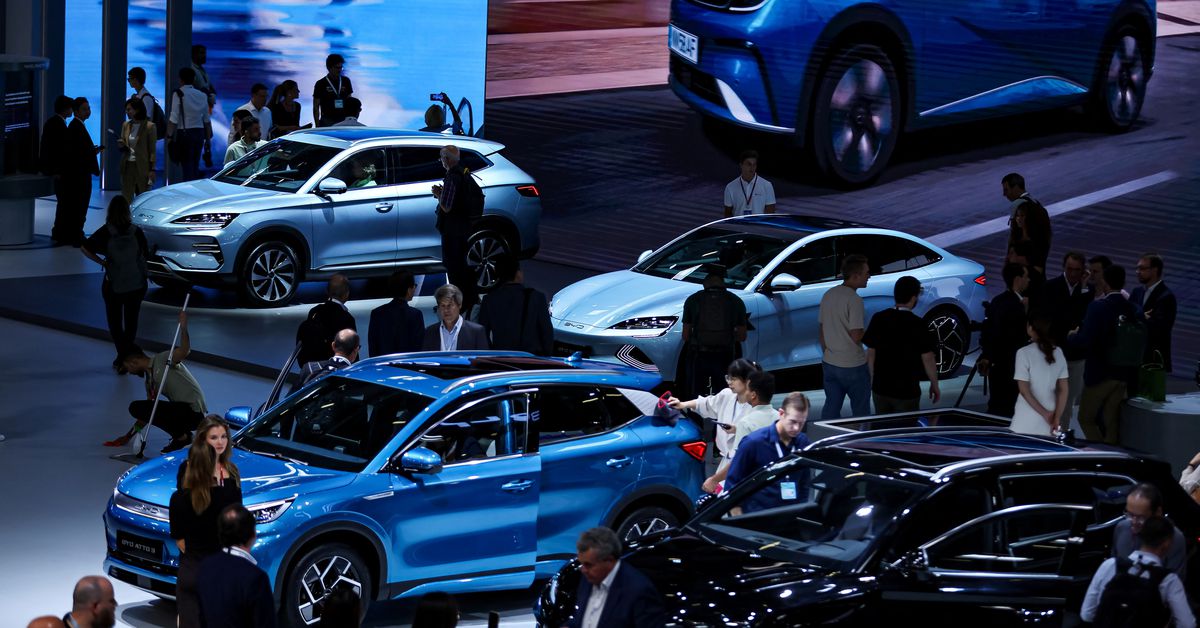Main points (to make up for the clickbaity title):
Challenge to bring down European EV manufacturing costs
Lower costs to close price gap with China EVs
China EV sales account for 8% of European total through July
Renault’s R5 EV to be 25%-30% cheaper than Scenic/Megane
MUNICH, Sept 4 (Reuters) - Europe’s carmakers have a fight on their hands to produce lower-cost electric vehicles (EVs) and erase China’s lead in developing cheaper, more consumer-friendly models, executives said at Munich’s IAA mobility show.
“We have to close the gap on costs with some Chinese players that started on EVs a generation earlier,” Renault (RENA.PA) CEO Luca de Meo told Reuters at the car show, adding when manufacturing costs decline, prices will also go down.
…continues



They creates this mess. This is a perfect “LeopardAteMyFace” situation.
For the last 15 to 20 years car makers have been fighting over themselves to get a foothold into the domestic Chinese market. To do so, the Chinese government required these foreign carmakers partner with a local company. Those local Chinese companies then had access to intellectual property, engineering data, design, planning and a whole host of other internal manufacturing data that was decades ahead of them.
Chinese carmakers were a good 50 years behind the rest of the industrialized world at the turn of the millennium. These days, they are roughly only a few years behind, to actually beijg ahead of them in some ways. All while still having some big labor savings. These Western car makers essentially trained their replacements and they did it for that sweet, sweet short term profit, while the Chinese government was playing the long game.
It’s quite a bit more complicated than that. Those joint ventures were for traditional cars, and even today Chinese automakers aren’t that great at making internal combustion engines. But in EVs, the Chinese didn’t get significant help from joint ventures; their EV industry predates foreign involvement (Tesla only set up there in 2018, a decade after BYD already started making their own EVs).
Sure, the Chinese probably picked up a lot of general industrial know-how from foreign investors, but a lot of their EV expertise is also based on figuring things out for themselves, and seizing an opportunity to exploit a new technology and disrupt slow moving incumbents.
EVs are easily.
They are considerably less complicated than ICE cars. And since they’ve been building iPhones and Playstations and TVs for a couple of decades now, they have the expertise to manufacture electrical components which is where they have learned about the E in EVs.
This the real truth. Anyone can make a BEV. It implies nothing when someone does. European car makers can do so if they wanted to. The problem is that people don’t want BEVs. They’re just too expensive and limiting.
Yeah, it was both. The european brands avoided electric cars for a long time, while the chinese pushed hard for them. And because electric motors and car batteries were a new technology, this was a great opportunity for the chinese to pull ahead(everyone started from 0).
And the chinese also used their cooperations and acquisitions(Volvo and Lotus are owned by the chinese brand Geely), in order to improve the conventional car making part production(everything other than the electric engine and batteries). Tesla followed a similar arc. Their motors/batteries are great, the other parts started as bad but they are improving all the time.
Also to add to that: a lot of the European carmakers also fought governments hard to give them more time with their fossil fuel cars and not to push/benefit EV as much as they wanted
Then Tesla came along and suddenly they had a lot of catch-up to do when they realised that people actually wanted those cars and now they are the ones behind the market since they slept to long
In Germany there’s a saying: “Wer nicht mit der Zeit geht der geht mit der Zeit” - basically: “If you’re not moving with the changes they will force you out eventually”
We have a similar saying:
Lead, follow, or get out of the way.
I have absolutely no love for German carmakers (at least not these days), but I do want to be fair here. The shift to electric is not as simple as people make it out to be. Yes, Tesla definitely was the one who got everything going and is still years ahead of the competition, but you have to understand that even today, EVs make up a small percent of new car sales in most countries. That percent is growing each year, but these companies have billions upon billions of dollars of tooling and know-how in how to create an ICE car, and those ICE cars still dominate the industry. On top of that most EVs are not really making anyone any money yet (except Tesla). So from I can’t blame carmakers in going about this very cautiously. With all the talk about EVs online, new car buyers are still not totally flocking to them in most countries. Early adopters are, sure, but average consumers are not. And that’s just the reality.
When the average share is held for less than 6 months it should come as no surprise that they sold their future for short term gain.
No argument there.
That’s where governments should have stepped in and said “woah. WTF are you guys doing?”
But in a free market economy, it is considered bad when governments tell companies what to do, usually.
China used the same playbook to steal Russian military tech